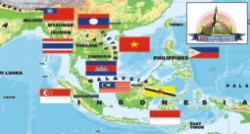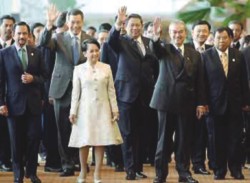| Neighbours
Out of Step with Asean
Amando Doronila, in Manila
 Somewhat naively, Philippines Foreign Secretary Alberto Romulo has announced that the Asean foreign ministers reached a “consensus” when they agreed in Manila last week to include a provision calling for the establishment of a human rights commission in the draft Asean charter celebrating its 40th anniversary this year. Romulo hailed the consensus as “an apparent victory for the Philippines,” since it was reached against tough opposition by Burma (Myanmar), which is ruled by a repressive military junta, and over the objections of Cambodia, Laos and Viet Nam, all single-party socialist states which said they were not ready for such a body. Somewhat naively, Philippines Foreign Secretary Alberto Romulo has announced that the Asean foreign ministers reached a “consensus” when they agreed in Manila last week to include a provision calling for the establishment of a human rights commission in the draft Asean charter celebrating its 40th anniversary this year. Romulo hailed the consensus as “an apparent victory for the Philippines,” since it was reached against tough opposition by Burma (Myanmar), which is ruled by a repressive military junta, and over the objections of Cambodia, Laos and Viet Nam, all single-party socialist states which said they were not ready for such a body.
But how can the agreement be called a “victory for human rights”, when it does not specify the sanctions available to the proposed commission to discipline member states violating human rights? This agreement is more conspicuous for the vagueness of its procedures than for its specificity, which is probably why Burma, Cambodia, Laos and Viet Nam agreed to it “in principle”.
Romulo said the ministers agreed on the “principle” of establishing the commission, with the disciplinary “teeth”, composition and function still to be defined and made “more explicit” when the charter is signed during the 13th Asean Summit in Singapore in November. Meanwhile, characteristically in keeping with the Asean style of avoiding resolution of hard issues through the mode of “consensus”, Asean will limp along till the next summit, coddling a toothless beast.
Ambassador Rosario Manalo, Filipino head of the High Level Task Force that drafted the charter, has described it as “an Asean way” of doing things.
 The Asean way works as a conflict-resolution formula by following the time-honoured Asean principle upon which it was founded in Bangkok in 1967, that Asean states resolve their conflicts through “non-interference” in the internal affairs of each state. The “consensus” mode was established as an Asian, specifically Asean, way of doing things. It dates back to the principle laid down by president Sukarno of Indonesia of musjawarah (mutual consultation) in his summit with president Diosdado Macapagal and prime minister Tunku Abdul Rahman of Malaya when they formed Maphilindo in 1963. The Asean way works as a conflict-resolution formula by following the time-honoured Asean principle upon which it was founded in Bangkok in 1967, that Asean states resolve their conflicts through “non-interference” in the internal affairs of each state. The “consensus” mode was established as an Asian, specifically Asean, way of doing things. It dates back to the principle laid down by president Sukarno of Indonesia of musjawarah (mutual consultation) in his summit with president Diosdado Macapagal and prime minister Tunku Abdul Rahman of Malaya when they formed Maphilindo in 1963.
This method has an anti-Western slant. In presenting the consensus model, Sukarno derided the Western liberal democratic model, such as we have in the Philippines, as unworkable in developing post-colonial society, and ridiculed it as “fifty-plus-one” democracy, that is through a formal parliamentary vote for a majority.
It is this tradition of consensus and non-interference among Asean states that has allowed the generals of Burma, which joined Asean in 1997, to resist pressure from fellow Asean members and the European Union to free Aung San Suu Kyi from detention and to participate in open political competition.
By speaking about “consensus”, Romulo has implicitly admitted that the Philippine initiative as rotating chair of this year's foreign ministers' meeting failed to convert Asean from a consensus-building into a rules-bound body with a formal mechanism (such as the human rights commission) to make decisions binding to member states.
At the foreign ministers' meeting in Manila, it was reported that the Philippines' proposal for a clause in the charter allowing Asean to vote on critical issues to expedite decisions, instead of relying on consensus, was struck down. The draft omitted mention of sanctions for member-states for serious breaches of the charter.
What Romulo pushed was not the Asean way of doing things but the Philippine perspective on human rights. Romulo was far too optimistic in making the Philippine perspective prevail in the next summit. Saying that he believed “there must be a human rights body in Asean”, he added that it should become “functional and operational” once the charter is signed and the members would be bound by it.
Romulo's perspective is defined by the Philippine experience that has seen a proliferation of human rights commissions established as legal bodies, such as the Commission on Human Rights and the Melo Commission that inquired into extrajudicial executions in the country. The record of these commissions in protecting human rights cannot serve as successful models for other Asean states to emulate.
The Romulo initiative only reveals how out of step the Philippines is with the Asean political and economic culture, which is characterised by wide diversity of political and social systems among member states, including military juntas, soft authoritarianism, such as Indonesia, Malaysia and Singapore, and capitalist-roader socialist states.
The United States lauded the “democratic ideals” of rule of law, good governance and respect for human rights embodied in the draft charter. In Manila for the post-ministerial meeting with Asean bilateral partners outside the region, Deputy Secretary of State John Negroponte said when the charter's ideals are actualised, these would allow the region to achieve peace, democracy, stability and prosperity.
These words are nothing more than platitudes that won't make Asean members change their organisation into a rules-bound group based on the rule of law or make the Myanmar junta less repressive. Negroponte offers little help to push the Romulo perspective in the next Asean summit, despite his pledge of America's “enduring commitment” to Asean and its “strong engagement” in the region.
This article was first published in the Philippine Daily Inquirer. Reprinted with permission. Copyright
(R) thedailystar.net 2007 |
